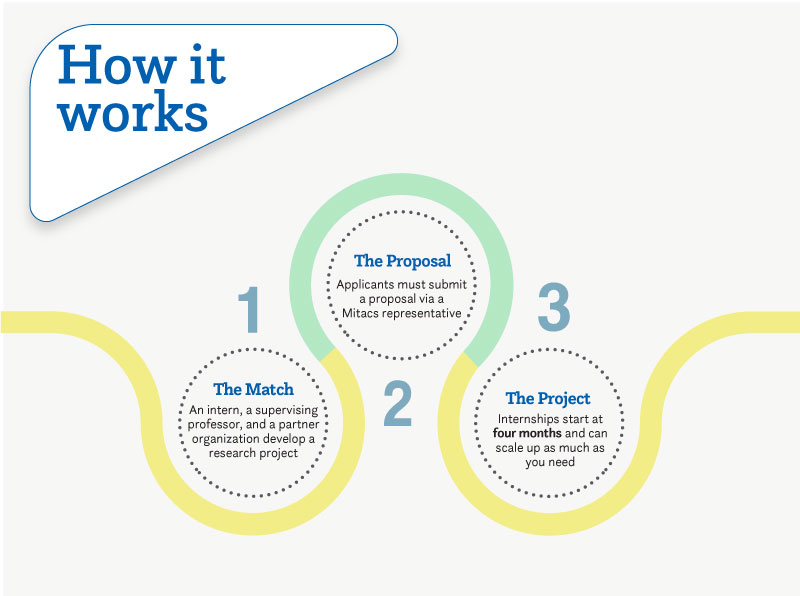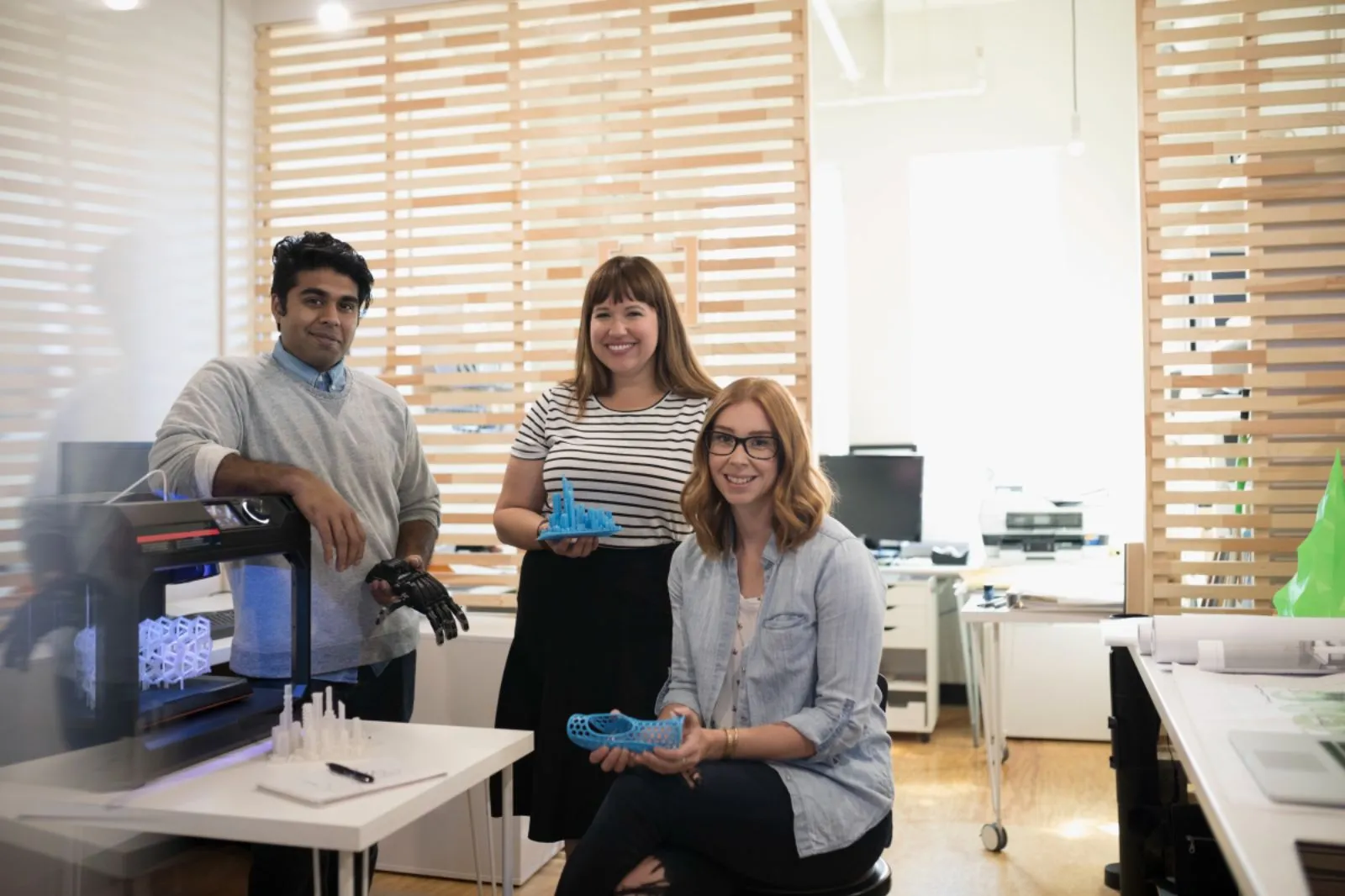
Program Details
About the program
Mitacs Accelerate creates dynamic collaborations that partner for-profit and not-for-profit organizations with Canada’s brightest academic minds. This research award provides leveraged funding of $15,000 CAD per four- or six-month internship, where interns will work collaboratively with their academic supervisor and partner organization on a research project.
The Accelerate program aims to:
- Help businesses optimize their budgets, grow their R&D and tap into the expertise of highly skilled students, graduate students, recent grads and post-docs to solve your research challenges.
- Help students broaden their professional networks, tap into funding opportunities, and gain invaluable hands-on experience at for-profit and not-for-profit partner organizations seeking skilled research talent.
- Help professors build game-changing research partnerships with industry leaders, tap into flexible funding, and help drive the innovation of tomorrow.
Project Extension
Mitacs project extensions are now available to Accelerate project holders who need more time to complete the objectives and deliverables as outlined in an approved Mitacs project. Though this streamlined application and adjudication process (with additional financial commitment from the partner organization), eligible applicants may extend the original project timeline by adding up to one internship unit (IU) per intern per project (to a maximum of 10 IUs per project). Project extensions can be used to overcome unexpected challenges, to incorporate additional scope, or to allow additional time to support implementation of results.
You are eligible to request an extension in your project if:
- At least 75% of your initial project is completed or your project has ended less than 4 months ago;
- The extension is requested to complete the initial objectives of the project;
- The extension request is for 1 internship unit per intern to a maximum of 10 internship units per project;
- The partner in the project will provide an additional contribution leverage by Mitacs with our standard funding model (see below).
Applications are often reviewed by Mitacs in as little as 3 weeks to keep projects moving forward with minimal delay.
For full eligibility criteria or to apply for a project extension, see this form. Completed forms should be submitted to your local Mitacs Advisor for revision and official submission to Mitacs for evaluation.
Funding
Our standard funding model requires a partner contribution starting at $7,500 CAD per internship (4 or 6 months) which results in a $15,000 CAD research award. Of this award, the intern must receive a minimum $10,000 CAD stipend or salary.
Our Postdoctoral researcher funding model requires a contribution of $10,000 CAD per internship (4 or 6 months) which results in a $20,000 CAD research award. This funding model is only available to postdoctoral interns.
The Project
Internships start at four months and can scale up as much as you need

Eligibility
Academic supervisors
- Academic supervisors are eligible if they are faculty at a Canadian academic institution who are eligible to hold Tri-Agency funds.
Partner organizations
- Partner organizations can be for-profit corporations (must receive more than 50% of their funds from non-government sources), eligible not-for-profit corporations, municipalities, or hospitals in Canada.
- For-profit businesses and not-for-profit corporations operating outside of Canada are eligible as additional partners on projects with a Canadian partner organization.
- Eligibility can be confirmed with a Mitacs Advisor.
Intern
An intern can be a Canadian citizen, a permanent resident, international student with a student visa, or international postdoctoral fellow with a valid work permit. Interns must be 18 years old or over, and fall into one of the following categories:
- Registered students and postdoctoral fellows at Mitacs partner colleges and universities in Canada. Postdoctoral fellows are eligible if the date of graduation from a PhD program is less than five years to the start date of the project. Exceptions are available for extenuating circumstances such as parental leave or military service. Fellows must not have been employed full-time at the partner organization prior to applying.
- Recent graduates (must be within two years of graduation at the start of their project), and non-degree students (diploma, certificate, etc) are eligible at the academic institution’s discretion. (Any interested applicants should check with their institution to first determine whether they are able to support other types of university interns before drafting an application.)
- Visiting students and researchers at Canadian academic institutions who are completing a degree at a university abroad may also be eligible at the discretion of the Canadian institution.
- How many internships can one intern do?
- Post-secondary students are eligible for any number of internships at the discretion of their institution. Interns must be enrolled as a student at an eligible institution throughout the course of the internship and have time in their schedule to commit to the project.
- Postdoctoral fellows can do up to nine (9) four-month internships (up to three (3) years)
- Recent graduates can complete up to three (3) four-month internships within two years of their graduation date
- Interns may not participate in more than one internship at the same time.
Further, all parties must declare any potential conflicts of interest upon application submission, including:
- An academic supervisor in a position of ownership, employment or influence over operations at the partner organization.
- An intern is in a position of ownership, employment or influence over operations at the partner organization.
- Programs participants with a close family relationship with each other, or with someone in a position of ownership employment or influence at the partner organization.
Interns may interact remotely with an international partner organization and/or travel to interact in person. Any travel must be in accordance with their Canadian academic institution’s policies.
How to Apply
Effective April 1, 2025, the Indigenous Pathways initiative will be reopening for the 2025-2026 fiscal year. As part of the new funding criteria, each partner organization will be limited to 12 Internship Units per submission year. Please contact your Mitacs advisor for questions or concerns.
For further details and before initiating an Accelerate application in the respective provinces, please contact your Mitacs Advisor
How to apply
- Review the following information when you begin writing your proposal:
- Mitacs Responsible Conduct of Research Policy ( found on “Mitacs Terms, Conditions & Policies”, including information on eligible research)
- Adjudication criteria (see at the bottom of this page under “Program Administration”)
- Writing Your Proposal guide (under “Application”)
- Mitacs’s other relevant policies (including Mitacs Indigenous Research Policy, Research Security Plan, etc), all findable on “Mitacs Terms, Conditions & Policies”.
2. Reach out to one of our Business Development team members to be paired with a Mitacs Advisor
3. Determine the right application process for your project (information below)
| Option 1: Our Digital Application Process | Option 2: Our Non-Digital Process |
|---|---|
|
In 2024, Mitacs launched a new digital application portal as a first step towards digitizing our entire application process, leveraging digital tools to further enhance your application experience. To be eligible for the new digital process, your project must:
We are striving to enable the above exclusions in our digital application as soon as possible. Steps to apply using our digital process (RAP):
|
Mitacs Accelerate is incrementally transitioning to a digital application process. To see if your project is a good fit for the digital process, please review the Accelerate Digital Application Process option. All applications eligible to be submitted via our digital process will be asked to do so. For applications that cannot yet be accommodated in our online portal, the below non-digital option remains open. Steps to Apply:
Proposal Package Requirements:
Please be sure to include supporting documents as required by your university or province. |
What happens next
Your application will be peer reviewed, which will take approximately six to eight weeks. Proposals with multiple internships or that require revisions may take longer. Please note there is a chance your application will be returned with a request for revisions before it is approved.
Following submission, partner organizations will receive an invoice (refundable if not approved), so that the intern receives payment when the project begins. Please note this invoice may be received before application approval, and does not guarantee approval.
Once an outcome is available, Mitacs will contact all participants with the decision and applicable instructions.
Following formal approval and the receipt of the partner contribution, Mitacs forwards the Accelerate funds to the academic institution to administer the award.
Please note no work should begin on a project until an Award Letter has been issued and funds have been distributed to the institution.
Application timeline

Questions? Consult the FAQ or reach out to [email protected]
Additional resources for partner organizations:
 TAX CREDITS FOR YOUR R&D
TAX CREDITS FOR YOUR R&D
 HOW ACCELERATE HELPS COMPANIES
HOW ACCELERATE HELPS COMPANIES
View our industry-survey infographic
 MITACS TERMS, CONDITIONS & POLICIES
MITACS TERMS, CONDITIONS & POLICIES
View and download our documents
Program Administration
Mitacs invoices a partner organization upon submission of their Accelerate proposal. Upon receipt of the partner’s contribution, Mitacs forwards the research award to the Canadian academic institution.
No funds will be released to the academic institution until the invoice has been paid and the proposal is approved. Mitacs has no control over when funds are administered by the academic institution.
If you have questions about your Accelerate award after Mitacs has released funds, contact your academic institution’s Office of Research Services (or equivalent).

Start Date and End Date Policy
Projects must adhere to the Start and End Date Policy.
Projects that exceed the limits stated in the policy will expire and be slated for cancellation. Participants who anticipate exceeding the limits should contact Mitacs with an explanation and request an adjustment to the project timeline.
All Mitacs-funded projects must adhere to the Mitacs Intellectual Property Policy.
The following universities have developed their own IP terms for Mitacs projects:
- Brock University
- Concordia University
- McGill University
- Simon Fraser University
- University of Alberta
- University of Calgary
- University of Ottawa
- University of Victoria
Note that these IP agreements may not apply to joint applications with other funding organizations.
All applications submitted to Mitacs undergo a rigorous review process to ensure the quality of proposals that receive Mitacs funding. For full details, please see the Accelerate section on our Adjudication page.
Responsibilities
The following steps outline the responsibilities of each Mitacs Accelerate participant before, during, and after their project. For projects with multiple internships, each intern is responsible for their individual steps.
Mitacs Accelerate Terms and Conditions outline participants’ responsibilities in further detail — each participant is expected to understand and adhere to the Terms and Conditions of the program.


